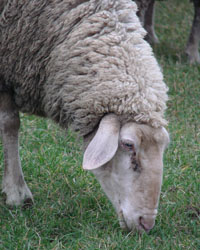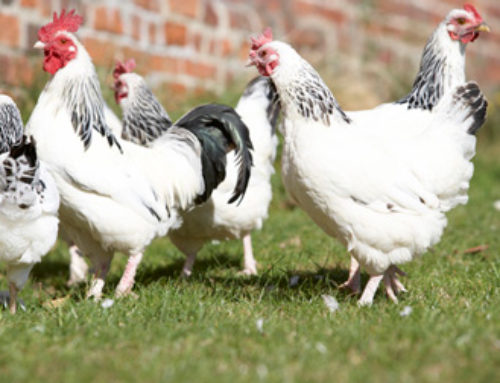 Kevin Roose, New York Times, 2 Nov 2011
Kevin Roose, New York Times, 2 Nov 2011
In this verdant lawn-filled college town, most people keep their lawn mowers tuned up by oiling the motor and sharpening the blades. Eddie Miller keeps his in shape with salt licks and shearing scissors.
Mr. Miller, 23, is the founder of Heritage Lawn Mowing, a company that rents out sheep — yes, sheep
— as a landscaping aid. For a small fee, Mr. Miller, whose official job title is "shepherd," brings his ovine squad to the yards of area homeowners, where the sheep spend anywhere from three hours to several days grazing on grass, weeds and dandelions.
The results, he said, are a win-win: the sheep eat free, saving him hundreds of dollars a month in food costs, and his clients get a freshly cut lawn, with none of the carbon emissions of a conventional gas-powered mower. (There are, of course, other emissions, which Mr. Miller said make for "all-natural fertilizer.")
"They countrify a city," Mr. Miller said of his four-legged staff. "And they lend a lot of awareness about how people lived in the past."
As an uncertain economy and a stagnant hiring climate continue to freeze people out of the traditional job market, a number of entrepreneurs like Mr. Miller, many of them in their 20s and 30s, are heading back to the land, starting small agricultural businesses. And in the process, they are discovering that modern homesteading offers more rewarding work, and possibly more security, than entering the white-collar fray.
Mr. Miller, a 2010 graduate of Boston University, started his business last year, when several post-college grant applications fell through and no other job opportunities presented themselves. He moved back home and acquired two Jacob sheep, a small, sturdy breed that dates to biblical times. Recently, he added two more to his flock, which he keeps in a pen in the backyard when not in service.
Customers pay $1 per sheep per day, but Mr. Miller also accepts barter payments, which have so far included karate lessons, jugs of maple syrup and the use of one homeowner's truck. He has done around 20 homes so far, and has so many requests he can't keep up with them.
Mr. Miller, who supplements his income by working on a local farm, has resisted raising his prices because he wants his services to be available to all. And while Heritage Lawn Mowing is not yet in the black, he says he has found a better way of life.
"It's a gateway to that whole rural dream," he said. "And with the type of recession we're having, there's stability in it."
Other yeoman start-ups are charting a more traditional path to profits.
Carrie Ferrence, 33, and Jacqueline Gjurgevich, 32, were in business school at Bainbridge Graduate Institute in Washington State when they noticed that many local neighborhoods were "food deserts," without easy access to fresh local produce and other grocery staples.
Their answer was StockBox Grocers, a company that repurposes old shipping containers as small grocery stores. The company won $12,500 in a local business plan competition and raised more than $20,000 online in a Kickstarter campaign to finance its first store, which opened in the Delridge neighborhood of Seattle in September.
"It's a tough job market, and you have really few instances in your life to do something that you really love," Ms. Ferrence said. "It's not that this is the alternative. It's the new plan A."
In terms of social cachet, agricultural start-ups are a long way from Silicon Valley. But the phenomenon seems to be gaining steam.
Worldwide Opportunities on Organic Farms, a nonprofit that matches willing farmhands with organic farms seeking temporary help, has become, for the 4-H crowd, what Stanford's computer science department has been for Silicon Valley. In the last three years, membership in the group's United States branch has quadrupled, and among a certain set of college-age agriculturalists, the organization has become a verb (as in "Did you WWOOF last summer?").
The agricultural start-up world has also benefited from the growth of the sustainable business community. There are now business school programs in sustainable entrepreneurship, sustainable start-up conferences and venture capital firms that invest solely in green businesses. Even Nike has gotten into the game, with a new sustainable venture fund that will allow it to "thrive in a sustainable economy, one where people, planet and profit are in balance," according to the company's Web site.
OF course, the mainstreaming of farm life has inspired a certain amount of skepticism among those with more agricultural experience.
Jason Stroud, 44, of Red Hook, Brooklyn, has been raising chickens since he was 19. He said he thinks many newcomers to the sustainable agriculture world are making a high-tech mountain out of a Bronze Age molehill.
"It's simpler than one would think," he said of modern-day homesteading. "Peasants with zero education were doing this hundreds of years ago."
After his regular work, restoring high-end antiques, dried up earlier this year, Mr. Stroud began advertising his farm skills to fad-chasing urbanites: for a price, he would build them backyard chicken coops and teach them to care for the birds.
The offer was so well received that Mr. Stroud estimates that nearly half of his income now comes from chicken consulting. He dispenses advice on a Web site called Red Hook Chicken Guy, where he lists the benefits of chicken farming in Brooklyn. (Reason No. 10: "It's just a cool thing to do.")
"It's a good opportunity for kids who have gone to college with degrees in Hungarian literature that they owe $300,000 on," he said, chuckling.
Mr. Stroud's wife, Susan Gregory Thomas, 42, began growing food for their family when her freelance writing failed to pay the grocery bills.
The economic downturn, she said, has widened the interest in farming beyond the bio-dilettantes and the merely curious: "It's not a movement that's going to go away. This economy has been so devastating to so many people that this idea of doing for one's self, which is very much an American idea, is taking hold."
But being an agricultural entrepreneur is not without its risks.
Richard Charles, a Wall Street technology manager, decided to become an urban farmer after he was laid off twice, first by Citigroup, in 2008, and then by Goldman Sachs, in 2009. He and a former colleague from Citigroup, David Lowe, started EcoVeggies, a company that uses aeroponic technology to grow plants without soil. Their plan is to convert abandoned buildings in Newark into high-tech urban farms that will supply produce to local restaurants and schools.
The reward "is the immense satisfaction of starting from a dream and doing something," said Mr. Charles, 44.
Still, he and Mr. Lowe used personal savings to finance their EgoVeggies project, and so far have failed to turn a profit. Mr. Charles, who has a day job at a renewal energy consulting firm, said he now works harder, and makes less, than he did on Wall Street.
Likewise, Ms. Ferrence of StockBox Grocers said that although she has gotten interest from investors, the first store is still in the red, and the low margins of the grocery business mean it will probably never generate huge profits.
As Mr. Charles put it, "Entrepreneurship is a great idea, but it's not for everyone."
Those who can either spare the money and the time or do without both, however, may find that going back to the land offers an appealing challenge.
On a recent afternoon, Mr. Miller took his flock of sheep to the home of a new client, where he tied them to two stakes in the backyard and watched as they began to eat.
Jacob sheep, he said, go first for broad-leaf plants, then for dandelions and clovers, and then for grass. They generally avoid flowers and other decorative growth, he added, and seem drawn to intruders like buckthorn plants.
"They have a built-in weed whacker," he said, stroking the fleece of a sheep that goes by the name of Princess.
Mr. Miller has had his setbacks. He lost one lamb to bloating earlier this year, another to parasites and a third when he gave an underperforming animal to a friend who wanted a lamb roast ("Layoffs," he said with a deadpan expression). Then there was the time his sheep escaped from their pen and were found hours later on a nearby street, and he was fined $50 by the police.
And now, with winter coming, snow will probably put a crimp in his profits.
But after seeing the results of his urban farming experiment, he said he wouldn't have done it any other way.
"Building a new America will require an understanding of farming," he said. "We have to look to the past to see the future."
Mr. Miller would like to go to graduate school to study sustainable development, and eventually wants to be the chief executive of an organic farm company. For now, though, he is looking to expand Heritage Lawn Mowing into neighboring towns, and increase the size of his flock so he can take on larger projects.
Highways, he has been thinking, are a good place to start.
"There's so much grass in the median strips," he said. "You could feed a lot of sheep with those."





Leave A Comment
You must be logged in to post a comment.